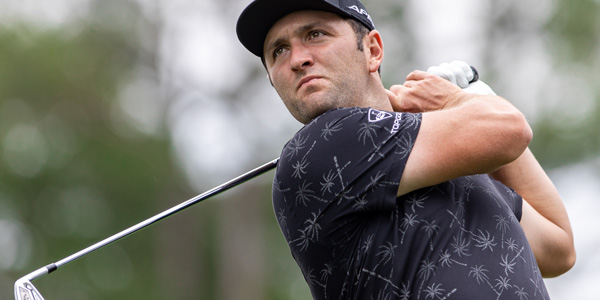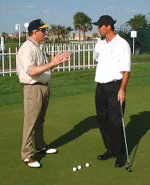
How to Improve Mental Toughness in Golf
What is the primary source of your stress during a round of golf? Do you feel confident in your ability to manage your stress while competing?
Simply put, stress increases when you focus on things other than the present moment.
For example, which self-statements do you think would increase your stress level?
“I’m going to hit the ball slightly to the right of the pin.” or “I need a birdie on this hole.”
“The greens are a bit grainy; hit the ball a bit harder.” or “I have to make up three strokes on the back nine?”
“Focus on this shot.” Or “I will probably double bogey again.”
When you focus on the present moment, you are playing from a position of trust as opposed to playing with fear.
There are two types of golfers:
1. The present-oriented golfer – When you are a present-oriented golfer, you are focused on your strategy for the current shot.
You make a firm decision and look to execute the plan as well as you can. Overall, you trust the process. The process can be summarized by:
- Have a plan.
- Execute the plan.
- Accept the result.
- Move on to the next shot.
2. The outcome-oriented golfer – You are primarily focused on the results when you are an outcome-oriented golfer. You still have a plan, but you are focused on the results.
You think about “what if’s,” such as, “What if I bogey this hole,” “What if I land in the bunker,” or “If I miss this putt, I will finish out of the Top-10.”
When focused on outcomes, you will be distracted and second-guess your strategy for each shot. With an outcome focus, you will experience a high degree of pressure and anxiety, leading to the same results you are trying to avoid.
Playing from a position of fear can be summarized by:
- Overthink your plan.
- Worry about a mistake.
- Become angry after a bad shot.
- Ruminate about the horrible result.
At the 2022 Masters, World No. 1 golfer Scottie Scheffler won his first major after being atop the leaderboard since Friday.
On the tournament’s final day, Scheffler started the day at nine-under and finished at ten under, beating Rory McIlroy by three strokes.
SCHEFFLER: “I think we just did such a good job of being really committed to what we were doing. And you know, that goes through all 72 holes, just whatever we were trying to do, I knew — I knew exactly where I wanted to put the ball and if I was to miss it, which side of the golf course I could be on to where I could still get it up-and-down… I think just stayed patient and trusted myself.”
The critical aspects of peak play are having patience, trusting in your abilities and plan, committing to your shot, and immersing yourself in the present moment.
Playing Golf with Trust:
Trust requires commitment and a present focus. The first step is to set a plan for your shot. Once your plan is in place, commit to your decisions–no second-guessing the plan, club, or target
When you commit fully to the plan, you will have more success with trusting your shot.
Related Golf Psychology Articles
- What is Mental Toughness in Golf?
- How to Improve Mental Toughness on the Golf Course
- Mental Toughness for Golfers
- Subscribe to The Golf Psychology Podcast on iTunes
- Subscribe to The Golf Psychology Podcast on Spotify
Golf Mental Coaching Programs

All golf psychology programs include the Golfer’s Mental Aptitude Assessment (GMAP), a custom Mental Game Plan, weekly coaching sessions, unlimited email correspondence, and The Golfer’s Mental Edge 2.0 workbook program.
One-on-one mental coaching is the fastest and most effective method to improve your mental game, boost your performance, and make lasting changes!
We have unique mental coaching programs, customized for you. Please contact us with any questions your have about our programs. Provide your name, email, and role below:
Or Call us today at 888-742-7225 | Mental Game Success Stories